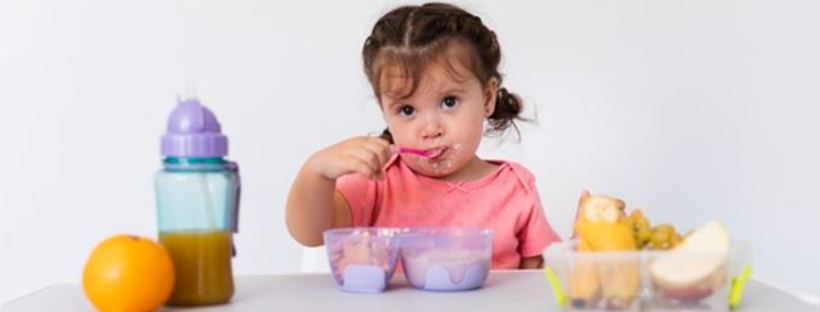10 Key Foods to Make your Baby Smarter & Sharper
 29201
29201

super easy
We all want our babies to be smart and sharp. We want them to be intelligent so that they can do well in life. It is the early years when the baby’s brain is rapidly developing and changing, and there is something you can do to help that development. To a very large extent, a child’s diet affects the development of the major organs such as the brain. Therefore, here is a list of 10 baby foods that you can feed your child that can help his/her brain development.
1. Eggs
Eggs are rich in protein and other nutrients that help children concentrate. Egg yolks contain cholesterol, which is what the outer lining of brain cells is comprised of. Eggs also contain choline and selenium, which is important for organ development and is also necessary for the brain and memory function. You can serve scrambled eggs or an omelet to your child. You could also make egg sandwiches. You can even puree or mash the eggs and add breast milk or water for a more liquid consistency.
2. Greek Yogurt
Full-fat Greek yogurt is very healthy for the brain. It has high protein content and helps keep the brain cells healthy. Yogurt is also high in probiotics, which keeps the gut healthy, and researchers have discovered a link between a healthy gut and brain. You can add fresh, pureed fruit to yogurt and serve it to your baby. Most children take well to yogurt because of its creamy texture and fruit adds to the taste.
3. Leafy Green Vegetables
Green vegetables such as spinach and kale have lutein and Vitamin K, which help in brain activity. They reduce your chances of getting dementia later on life and also help new brain cells to grow. You can add these to smoothies or puree them and add to parathas. Kale can also be roasted with a bit of olive oil to make kale chips.
Tips for Healthy Snacks for Kids
Let your kids have some fun with food; healthy eating need not be boring:
Use healthy alternatives like olive oil to sauté and fry.
Switch to whole grain for dishes such as multigrain pizza, millet cakes, or ragi dosa.
Add seasonal fruits in sweet treats such as mango muffins, whole wheat pancakes with cherries, or make a delicious crumble.
Substitute cheese and mayonnaise with homemade spreads like hung-curd and hummus.
4. Nuts & Seeds
Nuts and seeds are packed with a number of proteins and essential nutrients and minerals. These also have iron and zinc, which are essential for brain function. You can add nut butter such as almond or peanut butter to your baby’s cereal or porridge. For slightly older children, you can also incorporate walnuts and sunflower seeds into their food. Flax seeds can be powdered and sprinkled over porridge and khichdi etc.
5. Broccoli
Broccoli is an excellent food for brain development. It contains DHA, which helps the neurons connect. It also has cancer-fighting properties and is excellent brain food. Broccoli is also rich in antioxidants, as are red and yellow bell peppers. For older children, sauté broccoli with garlic and serve to your child. You can also add herbs such as oregano etc. for more flavor. For younger children, you can steam it and puree it. Avoid boiling, etc., since most nutrients will be lost in the water.
6. Fish
Fish such as tuna and salmon are a rich source of Vitamin D and Omega 3’s. These help the brain in preventing memory loss and declining mental skills. Salmon, especially, is known to contain DHA, which is essential for the brain’s functioning. Grill or bake and serve to slightly older children. Avoid deep-frying, since that causes maximum loss of nutrients.
7. Oatmeal
Oats are rich in fiber and proteins that keep the heart and brain arteries clear. Sugary cereals lead to a peak in blood sugar levels, causing an energy crash within hours. Oatmeal, on the other hand, has a low glycemic index and is absorbed slowly. Oats are also known to improve concentration and memory. They are rich in Vitamin K, zinc, phosphorus, thiamin, niacin, and B-complex Vitamins, which help in making neurotransmitters. The best way for babies to consume oats is in the form of oatmeal. You can add cinnamon and fresh fruits and berries to your oatmeal to make it more filling. You can also add oat flour to parathas etc.
8. Berries
Berries are a wonderful source of antioxidants, which helps in preventing neuron damage and also helps to improve cognition and motor control. They also help to improve memory due to high Vitamin C content. Most babies, as well as older children, love berries. Puree and serve them to younger children and slice them for older children. You can also add them to pancakes and cupcakes or to yogurt and smoothies.
9. Avocados
Avocados are a favorite first food for many babies because of their rich and creamy texture. Avocados have a number of healthy fats that help the brain and nervous system develop normally. Avocados have over 20 vitamins and minerals, which makes them a superfood. Avocados also help promote blood flow to the brain. These are the easiest food to feed your baby since they require no cooking. All you need to do is a puree and feed the baby. For older children, you can cut it into bite-sized pieces or serve it over toast.
10. Beans & Legumes
Beans and legumes are an excellent source of carbohydrates, fiber, and Vitamin B. Vitamin B is essential in the formation of neurotransmitters that pass signals between nerves. However, because Vitamin B is water-soluble, you need to consume these on a regular basis. Make a puree of lentils and add to your baby’s soup. You can also add them to the dough and make parathas out of them.
It is never too early to start working on your baby’s brain development. Even when you are pregnant or breast-feeding, you can incorporate most of these foods into your diet so that your little one can get the benefit, and you can help your brain stay healthy and sharp.
Follow Us-
Instagram/ Facebook/ Youtube/ Pinterest





Leave a Reply